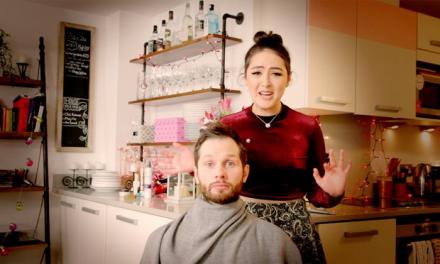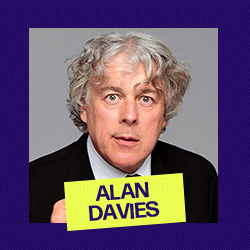By Florence Greenwood on 18/2/2017

The premise is simple. Desperate for cash, known-grumbler Liam Williams drunkenly enters an online competition to find the next hot young thing in ‘vlogging’. But unable to shed the cynicism that has come to define his stand-up IRL, he drunkenly posts a video tirade against the medium, crying out about while the ice caps are melting all these people do is ‘talk’. And by the power vested in that untenable entity - the great British public - Williams’ Vloggy McVlogface soon climbs to the number one spot.
It is crucial that we begin here, with an embittered Williams (pictured with Emma Sidi). Along with a natural cynicism that comes from being a solitary outsider (by demographic) looking in on a huge phenomenon, comes an opportunity for authentic enquiry. In his characterisation of Liam the presenter of this show, Williams self-consciously plays on the notion that those of us watching with a foreknowledge of his stand-up will recognise that he is as much a culprit in cultivating a brand as the characters we meet along the way (though he may depart from the “airy discourse” he identifies in his/the show’s subjects).
With Williams in the role he knowingly plays best, the format of the self-reflexive mockumentary in which he is the central character in a show that is commissioned by the BBC (which is really commissioned by the BBC) and in which he is forced to participate in the industry (which really is an industry) of vlogging through six challenges across the six blog-shaped episodes.
Pls Like soon flags up the genuinely dark side to this business - lucrative advertising campaigns that season every successful blog - and how this chimes with the medium as one through which disenfranchised and lonely young people can find solace or a voice to listen to. When that voice loses its creative licence and naive charm, why should we listen to it? Standing in as the eery corporate presence looming over these ‘home-made’ videos is James Wirm (Tim Key, playing the part with discomforting perfection).
But a greater question is being posed by the series. In an ouroborosian fashion this is a show about the nature of YouTubers, available only through YouTube. Is it self-critiquing content? Or is it a clever response to the important question of social responsibility and the question of art that reasonably accompanies new mediums. If BBC3 validates the medium through which the likes of Zoella have made their own, independent fortunes, how does television as an entity respond?
The show balances a subtle undoing of the phenomenon with unabashed digs in the narration and cuts to acerbic ‘facts’ about vlogging. In asking some important questions as we enter a new dawn of television-slash-content consumption, Pls Like is a pretty good starting point.
Watch here. Episodes are released on Saturdays. Second episode out now.




